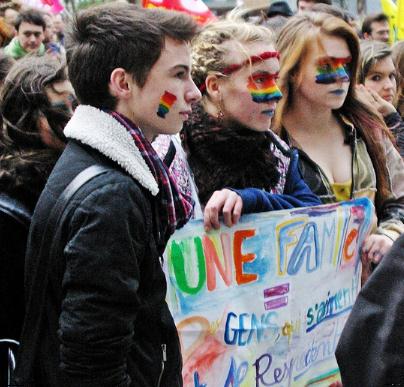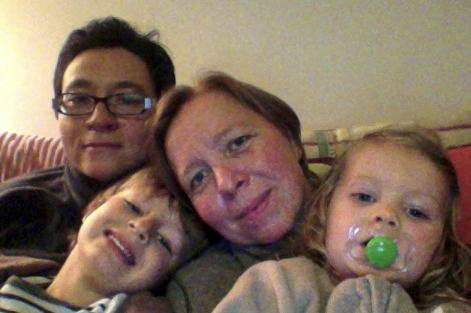
France continues to react to President François Hollande's plan to legalize same-sex marriage and adoption with nearly weekly demonstrations, for and against. Credit: Dave Yin

Activists protest in support of same-sex marriage in Lorient, France. Meanwhile, the country's ambitious attempt to reform education to include queer issues flies under the radar. Credit: Dave Yin
At four and a half years old, Gabin knows as well as anybody that his family is a little bit different. At his kindergarten in Meudon, a small town just southwest of Paris, he is also not keen on keeping it a secret.
“’My name is Gabin . . . and I have two moms,’ he would say when introducing himself,” explains Valérie Duval, one of Gabin’s parents, her voice filled with pride. Her son, she says, doesn’t mind answering questions from the other kids. Rather, it’s the other adults who have seemed hesitant to broach the subject with Duval and her partner of eight years.
If Gabin’s government gets its way, by the time he attends Grade 1, schools across France will be teaching topics that include sexual orientation and gay parenting, subjects he is already familiar with.
“For him right now it’s normal,” Duval says. She and her partner, Florence Dupre, had their son four years into their relationship and his sister, Daphné, two years later.
“We talked to him about [our family] pretty early on,” she says.
As a gay parent, Duval advocates for the inclusion of queer themes in France’s classrooms. As an elementary school teacher, she does what she can to avoid heteronormative themes and traditional gender roles in her lessons, themes that she says still plague existing manuals.
These manuals, says Daniel Labaquère, a national secretary for France’s SNUiip teachers’ union, have not been updated since 2008.
All this may change next year, however, as France’s fledgling socialist government introduces sweeping reforms to match its mandate to become a leader in the fight against homophobia.
Its goals cover the expected – combating stereotypes, promoting equality in the workforce and curbing violence and discrimination against queer and trans people. Yet, President François Hollande’s ambitions reach even further to include, notably, the universal decriminalization of homosexuality, which he called for at his first UN General Assembly address back in September.
For French schools, this may finally translate into new manuals or training for new and existing instructors. But more importantly, it might mean a new attitude toward teaching, Labaquère says.
“We have two ministries, the Ministry of Women’s Rights and the Ministry of Education, that have said that we should fight against homophobia starting in elementary school,” Labaquère says. “This will be a big change from before, where we used to say that even in middle school . . . no, no, no, the students are not old enough [to learn about sexuality].”
There are no concrete outlines yet, but the Ministry of Women’s Rights has announced that questions related to sexual orientation are on the agenda from primary to secondary school. Furthermore, associations wishing to intervene against homophobia in a school setting will also gain federal approval in a drastic move to prevent suicides among youth.
“Kids between six and 11 years old know to use the word ‘fag,’” says Duval, who is openly lesbian at work and says she has experienced prejudice from her own students and their parents. “Bullying is very common.”
France’s proposals are reminiscent of themes featured in the ill-fated sex-ed portions of Ontario’s 2010 Health and Physical Education curriculum. At the time, the new topics were briefly defended from criticism before being completely gutted by Liberal Premier Dalton McGuinty prior to the program coming to effect, despite its backing by the AIDS Committee of Toronto, the Elementary Teachers’ Federation of Ontario, Egale Canada and the NDP, among others.
Aspects that drew ire included introducing genitalia terms in Grade 1, sexual orientation by Grade 3, gender identity by Grade 6, and anal intercourse by Grade 7. Before its about-face, the McGuinty government’s stance was that age appropriateness meant providing access to relevant information “before [students] reach an age at which they need to make decisions,” rather than after.
Today, revisiting the topic of sex-ed in Ontario is something few politicians seem willing to do, even in the wake of McGuinty’s resignation. Only Gerard Kennedy and Sandra Pupatello responded to a survey of candidates running for the leadership of the Ontario Liberal Party in January.
“If the LGBT community feels that this was not done properly, I’d be happy to take a look at it,” Kennedy says. “The curriculum should reflect the broad community and . . . our view on diversity as consistently as elsewhere.”
However, he stopped short of making promises, unlike Pupatello, who in an email response committed to “bringing a curriculum forward as soon as possible.”
As France will try to prove next year, past failure is not a deterrent.
Much like Ontario, France’s 2010 attempt to reform education under a then-conservative government was quickly withdrawn under similar pressure from advocates for the traditional family and religious groups, according to reports in local media.
This time, however, the announcement seems to have slipped under the radar as the legalization of gay marriage and adoption, which together front the government’s efforts, continue to headline public debate.
Waves of demonstrations for and against legalizing same-sex marriage and adoption have swept across more than 75 cities in France throughout October and November.
One organizer of a small pro-marriage-equality rally in Lorient, on the west coast of France, was not even aware that educational reforms are being proposed.
“The topic hasn’t really been broached,” says Mickael Cornec, admitting that he didn’t know much about the subject. “It’s not really being debated right now. It’s a sub-topic.”
For better or worse, says Labaquère.
“We hope that it will change people’s attitudes towards [the new curriculum] once laws have changed,” he explains, referring to those on gay marriage and adoption. “People will hopefully see that the couples that get married are just like any other ones.”
For now, those pining for a peek at new proposals will have to settle on pamphlets. The Ministry of Education is very tight-lipped about what progress it has made as part of a slew of consultations between the state and more than 70 autonomous organizations listed on the government’s website.
These include queer family groups, student associations, educational and research groups, sports associations, trans groups, labour collectives, feminist groups and international human rights groups, most notably Amnesty International.
At least one anti-discrimination group claimed that textbooks will feature studies being conducted by HALDE, the French Equal Opportunities and Anti-Discrimination Commission, and that biology classes will be modified to discuss gender.
“We don’t have any more recent information,” wrote Samra Bonvoisin, a spokesperson for the French Ministry of Education, in an email emphasizing that the target window for implementation is still fall 2013.
Until then, the institution as a whole will continue to “perpetuate discrimination,” Labaquère says.
“There isn’t a single teacher that uses . . . the words ‘gay,’ ‘lesbian’ and ‘homosexual,’” he says. “The silence . . . reinforces the difficulties faced by youth.”
Meanwhile, Duval reminds that adults will also have to face up to difficulties. “The mindset of teachers need to be changed as much as those of students and their parents,” she says. Duval adds that while Gabin is still too young to understand the prejudice in his country, her child is becoming aware that the idea that he has two moms bothers certain people.
But when it comes to making a difference in the classroom under the new curriculum, “it would be easier,” she says. “I’m mildly optimistic.”


 Why you can trust Xtra
Why you can trust Xtra


